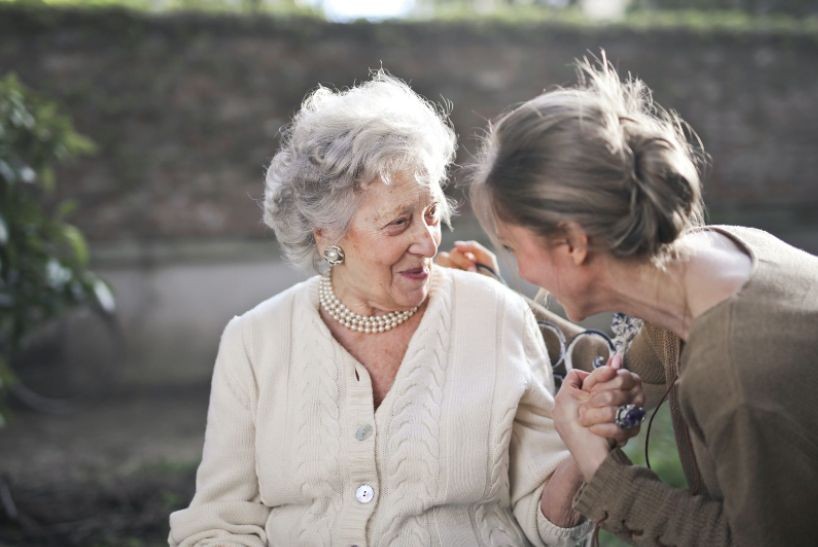Palliative Care: Palliative Home Care
Specialist topics
Palliative Care: Palliative Home Care
Palliative Spitex is dedicated to palliative care. This is a holistic care concept with international recognition. It combines the care and support of seriously ill people of all ages with advice for clients and their relatives.

Compared to euthanasia, which accompanies the client in the last weeks and days of their life, palliative Spitex has more extensive tasks. Despite a serious illness, the client should be able to live as long as possible in their familiar surroundings. This period can last several months or even years.
Palliative care thus clearly distinguishes itself from euthanasia. This form of support can be used at an early stage. Ideally, it begins as soon as the diagnosis is made. The client's death is also discussed as part of this type of support.
Palliative care: how palliative Spitex deals with the topic of death
Palliative Spitex helps the client to accept death as the natural end of life and advises against artificially delaying death. Death is difficult for everyone to accept. This is not only due to the evolutionary urge to protect one's own life at all times. The thought of having to leave family and friends behind and knowing how much they will grieve makes it even more difficult.
In the dying phase, clients are often overcome by feelings that they had previously suppressed. Things that they had actually already come to terms with suddenly resurface and entire world views can suddenly change. The reason for this is often that the clients did not want to burden their relatives with difficult issues of this kind.
But now the last opportunities present themselves. This time is also psychologically stressful for the client and their family, which is why holistic care is particularly important. Often everyone involved tries to pretend that everything is fine until the end and as best they can. However, communication is important and helps the family to come to terms with the situation later on. This is exactly what palliative Spitex pays attention to.
Get help at an early stage
In palliative care, various representatives from the healthcare sector work together. The client's relatives and volunteers are also involved. The earlier appropriate specialist staff are involved, the better the client and their family can cope with the situation.
Additional hospital stays can also be minimized. Various studies show that early palliative care not only improves the quality of life, but can also prolong the remaining period of life. This is precisely the aim of palliative Spitex: to enable the best possible quality of life for the client and their family.
Palliative home care takes all of this into account
Palliative Spitex takes into account any physical, psychological and social needs that the seriously ill client and their family may have. Family members and close confidants are included in the palliative care and also receive support. If the client can no longer express their wishes and needs themselves, the family is an important transmitter of this information.
They are often better able to find out what the client wants to tell the palliative Spitex specialists. This is particularly important if the client has not drawn up any advance directives. The family's personal knowledge of the client is then an important aid. The client's needs and wishes form the basis for any treatment and care measures.
Palliative Spitex provides these services

The measures implemented by the palliative Spitex staff are individually tailored to the wishes and needs of the client. The specialists regularly adapt them to the development of the client's state of health. Part of the care includes
- Medical care
- Pain management
- Relaxation exercises
- Support during periods of anxiety and depression
- Acceptance of death
- Coping with grief
The client receives comprehensive and optimally coordinated nursing care on a physical and psychological level. The contents of the client's advance directives and powers of attorney are always taken into account.
Among other things, the Spitex staff ensure that the client always takes their medication correctly. Therapy is adapted to changing needs if necessary. In the event of pain, the client receives treatment that is as effective and fast-acting as possible. The client's well-being always takes priority. If necessary, the Spitex specialists provide the client with special food that is particularly high in protein or high in calories, for example.
Support on an emotional level

Palliative Spitex staff are always open with clients about their illness and impending death. Nevertheless, they never take away their hope, but offer them emotional support. If the client is going through depressive phases or is increasingly afraid of what lies ahead, they will receive psychological help. Therapists and counselors take on this task.
Massages, aromatherapy and relaxation exercises are used to improve the client's well-being on both a physical and mental level. During these treatments, the client concentrates entirely on themselves and can forget their illness for a moment. In this way, they recharge their batteries. The Spitex staff help the client to resume old hobbies and talk about times gone by.
In this way, they both evoke old memories together and create new happy moments. Nevertheless, the current situation is not pushed aside. Staff and client always talk openly about the current state of mind and changing needs. The palliative Spitex specialists do everything they can to enable the client to die with dignity. They also accompany the family and close relatives during this time, giving them comfort and helping them to cope with their grief.
The people involved
In order to meet the client's needs, close cooperation between various professional groups in the healthcare system and other sectors is necessary. In the context of palliative care, there is close networking between numerous parties involved.
It is not only the cooperation between the palliative Spitex specialists and the attending physicians that is important. There are also chaplains, psychotherapists and social pedagogues who offer support to both the client and their family.
If necessary, dieticians, speech therapists, physiotherapists and occupational therapists are also involved. Music and art teachers ensure that emotions can also be processed in an artistic way. Many people find it difficult to talk openly about their difficult situation. Artistic methods of expression are particularly suitable for them, as they allow them to process the situation in a different, less direct way.
Palliative care in your own four walls
If a person requires palliative care, this can be provided either as an inpatient or outpatient. Providing care at home has numerous advantages. The client can remain in their familiar surroundings, which significantly increases the feel-good factor.
In addition, the family can be there at all times and no personal belongings need to be left behind. However, if you decide to provide palliative care at home, there are a few things to organize in advance. Check whether special aids are required. The apartment or house may need to be adapted to make it barrier-free.
A suitable care bed may also need to be procured. If the client lives alone and is no longer able to cook their own meals, there is also a need for action here. If desired, the palliative Spitex specialist staff can prepare the meals. The same applies to household tasks such as laundry.
It is important to carefully examine which forms of care can be provided at home in familiar surroundings. This may be the case if a person is seriously ill and there is no longer any chance of recovery. At this point, it is possible to opt for outpatient palliative care. Alternatively, the client may be accommodated in a special palliative care unit in a hospital.
Palliative care in hospital

If care at home is chosen and outpatient palliative care is not sufficient, it is not necessarily necessary to switch to hospital. In this case, specialized palliative care can be used. This makes it possible to care for clients who require extensive treatment at home.
The palliative Spitex specialists have in-depth specialist knowledge and always ensure comprehensive and competent care. They document any measures and changes in the patient's state of health digitally so that the family can also keep a close eye on everything if they wish.
The staff inform the client of any events and are open and honest about the current situation. There is always close contact with all doctors, therapists, pharmacies, family members and other involved parties. Palliative care sees itself as a close network of various representatives from the fields of health and therapy. This ensures the highest possible quality of life until the last day.
Support for caregiving relatives too
The situation is not only difficult for the client to cope with. The family also suffers, which is why palliative care also includes support for them. If the family members are always tense and depressed, this also has a negative impact on the client's mental well-being. This is exactly what needs to be avoided if possible. Relatives of a person suffering from a terminal illness are advised to make use of the psychological help on offer. This benefits both the family and the client.
What is the ethics committee's position on palliative home care?

The discussion repeatedly arises as to whether palliative care can in some way be seen as assisted suicide. The Ethics Committee of the SBK has dealt intensively with this question. First of all, it should be noted that palliative care helps people to accept natural death. Life is no longer artificially prolonged.
It is not active support in simply ending life. The Ethics Committee shares this view. Palliative care services must under no circumstances encourage the emergence of suicidal wishes. Furthermore, suicide must never become a cost-effective way out for the healthcare system.
We all have a preventive responsibility, not only in the healthcare sector, but also in society in general. This includes setting legal boundaries and also supporting the responsible caregivers. This brings us to the next topic: the moral stress faced by palliative care nurses.
Home care professionals in moral conflict

For example, there is the conflict of interest in which every member of the medical and nursing professions finds themselves. The focus of their work is strictly on preserving life. On the other hand, it is also their task to alleviate the suffering of their clients in the best possible way. These two points are not always compatible. This is where the moral conscience of professionals comes into play.
According to the guidelines of the Swiss Academy of Medical Sciences (SAMS), no coercion may be exerted on them in accordance with their freedom of conscience. This also corresponds to the FMH code of ethics. It states that medical and nursing professionals must not perform any actions that they cannot reconcile with their conscience.
If there is no longer any chance of a complete cure and palliative measures are used, this conflict is defused. The main concern then is to alleviate the symptoms in order to make the remaining time as pleasant as possible. This is why the possibilities must be fully exploited.
In 1997, the Federal Department of Justice and Police commissioned a working group to look into the following question. Is it legitimate to allow a client to determine his own end? The group came to the conclusion that everyone has the right to refrain from life-sustaining measures.
This led to heated discussions in politics and the media, and the Federal Council re-examined the matter in 2000. It ultimately rejected the results of the working group. At the same time, it emphasized once again that the possibilities of palliative care should be fully exploited at all times.
What about the stress factor for palliative home care staff?
When a client is facing the end of their life, they require a very special level of care. Palliative care professionals play a key role in this. Fortunately, this field is currently developing rapidly. Great commitment is required to ensure that the client's autonomy remains paramount at all times.
Nevertheless, the provision of palliative care is not yet as widespread as it needs to be. In most cases, this is due to organizational and financial reasons. The lack of specialist staff in the care sector, which has a direct impact on Spitex specialists, also plays an important role.
The emotional burden

The professionals also carry an emotional burden. Caring for clients at the end of their lives confronts Spitex staff time and again with the fact that life can be full of suffering. Watching people die is part of their everyday lives, and this does not leave them unscathed.
A certain bond, perhaps even on an almost friendly level, quickly develops, especially with prolonged palliative care. Accompanying these clients as they pass away is not easy. Some Spitex specialists also describe how more and more clients with severe health impairments turn to euthanasia organizations at a certain point.
The professionals observe how clients' will to live diminishes and how they fear that they are a great burden on their families. It is then the task of the Spitex specialists to strengthen the client's psyche and rekindle their will to live. This demands enormous mental strength from them time and again.
Assisted suicide is not part of the nursing mission, but accompanying clients until the end of their lives is. It is irrelevant whether they wish to intervene in their own dying process or not. The wishes of each client must be respected, even if the nursing staff cannot reconcile them with their own moral standards.
Of course, the specialist staff at every Spitex are trained accordingly. They are able to withstand emotionally upsetting moments and be strong for two. Nevertheless, the burden they carry day after day should not be ignored.
In particularly difficult situations, even the professionals can feel helpless at times. This can be the case, for example, if they are no longer able to uphold their professional and personal values.
What can be done to reduce the moral stress of professionals?

No client should ever be left alone with their fears and feelings. However, this also applies to the home care professionals who look after them. The moral stress that often plagues employees must be taken seriously.
Critical situations should be discussed and reflected upon as a team. This exchange is very important. It strengthens cohesion within the Spitex team and shows the professionals that they are not alone with their feelings.
There is also the issue of grief. It has already been mentioned that very close bonds can develop, especially when clients have been with us for a long time. This makes it all the more difficult for care staff to accept and come to terms with the death of certain clients. Farewell rituals can then be helpful. They can prevent grief from accumulating and weighing heavily on the minds of professionals.
As already explained, close contact with the client's relatives is also part of palliative care. This gives the hospital staff the opportunity to consult with the family on moral issues.
There are clients' wishes that must be followed up, but which morality would like to oppose. In such cases, it can ease the conscience of the professionals to know the opinion of the relatives.
Why is it so important to pay more attention to the mental health of palliative home care professionals?

The quality of palliative care naturally depends to a large extent on the work of the home care professionals. This in turn depends on their mental state. Only mentally healthy Spitex staff can guarantee high-quality care. A high level of resilience is therefore required here. Numerous factors come together that can damage the mental health of professionals.
Coping strategies should therefore be an integral part of everyday working life. Professionals who can rely on good protection against the multidimensional stress of their job guarantee high-quality palliative care. If there are no ways of coping with stressful events, they will find it increasingly difficult to show their strength to clients.
Spitex staff are an important source of positivity, vitality and willpower. If too little value is placed on the mental health of home care professionals, this source will eventually dry up. This then happens to the detriment of the clients.
Choosing the best palliative Spitex
Once the decision has been made to make use of outpatient palliative care, it is important to find a suitable Spitex. There are a large number of such organizations and the choice is not easy. Which palliative Spitex is the right one? We at OPAN® support you during this difficult time.
We will show you which Spitex in your area meets the needs of the future client, and the choice is yours. You have the option of leaving the selection and registration to the attending physician or doing it yourself. To do this, enter the zip code of your relative who needs palliative care.
Possible Spitex organizations will appear in the Palliative Spitex register. Compare the organizations together with your relative and take your time. This decision should be made carefully, so don't rush into anything.
Once you have made your decision, provide various personal details about your relative. In addition, the attending physician can send the necessary medical documents to the palliative Spitex. Data processing by the chosen Spitex organization is carried out as quickly as possible, even outside office hours.
In order for the health insurance company to cover certain services, a needs assessment must be submitted. The palliative Spitex specialists check which services are urgently required. The attending doctor will also check all this again and then send the assessment to the health insurance company. All other services that your relative wishes to make use of must be financed by themselves.
Finding palliative Spitex directly
When it is time to seek palliative care, the right Spitex should be chosen carefully. During this difficult time, both the client and their family need comprehensive support at various levels. The aim is to give the remaining time of life the highest possible quality.
This includes not only medical care, but also psychological support and the creation of happy memories. Palliative Spitex specialists are given very private insights and work closely with the client and their family.
Care is therefore required when making a decision. OPAN® offers support in making the best choice between all the Spitex organizations. Do you also need help finding a palliative Spitex for your relative? Then fill out our contact form and get in touch with us.
